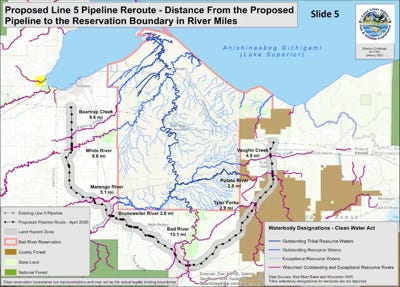HEADLINE: “DNR makes its case for issuing permits for Line 5 reroute project”
“Experts presented by the Department of Natural Resources testified throughout last week on why the department made the right decision to issue permits for Enbridge’s Line 5 reroute proposal.”
PREVIOUS
Mary Ellen (Jolma) Blakeman
Mary Ellen (Jolma) Blakeman, 82, of Marengo, WI, passed away Friday, April 11, 2…
NEXT UP
Northland College listed on real estate market
Want to buy a college? Northland College’s campus is officially for sale.
TOP STORY
DNR makes its case for issuing permits for Line 5 reroute project

Experts presented by the Department of Natural Resources testified throughout last week on why the department made the right decision to issue permits for Enbridge’s Line 5 reroute proposal.
The permits would approve Enbridge’s proposal for a 41-mile reroute of its oil and natural gas pipeline around the Bad River Band of Lake Superior Chippewa reservation.
“The plans were well developed and went beyond meeting expectations,” said Melissa Yarrington, a storm water program coordinator for the DNR. “Enbridge was very responsive, replying to requests and questions, and either met or exceeded Best Management Practices associated with the technical requirements. All of our teams’ concerns were met, in fact, Enbridge added additional BMPs to several areas within the plan.”
Line 5 transports up to 23 million gallons of oil and natural gas daily from Superior to Sarnia, Ontario, Canada. Within Ashland County, the existing pipeline crosses through 12 miles of the Bad River Reservation.
DNR Storm Water Engineer Amy Minser said there were perceptions that there are shortcomings on the project design; however, she said the DNR’s review team looked at the plans closely.
“Our review was very site specific. We did the same review for every site, and the team was all in agreement that all concerns were addressed and requirements addressed,” Minser said.
Dr. Matthew Horn, who has a doctorate in oceanography and an undergrad in the science of earth systems, said Enbridge selected the safest route for the relocation project.
“What we did, using over 12,000 different scenarios, … [is] quantified each one of these as well as those that Pipeline and Hazardous Materials Safety Administration designated as federally designated, other populated areas, drinking water areas, environmentally sensitive areas, and commercial navigable waterways. What this did was confirm the proposed route is the safest route,” he said.
Testimony from DNR’s witnesses follow weeks of testimony from both Earth Justice and Enbridge.
Earth Justice, a nonprofit public interest organization, challenged the DNR’s approval on behalf of the tribe. Environmental organizations Clean Wisconsin and Midwest Environmental Advocates filed petitions as well.
Enbridge has been working since 2020 to receive federal and state permits after the Bad River tribe filed a federal lawsuit requiring Enbridge to remove Line 5 from the reservation.
A federal judge ruled in 2022 the company’s existing pipeline is trespassing on tribal land. The company was ordered to cease operating Line 5 on the reservation entirely by June 2026.
If the project is approved, construction is expected to last about a year and Enbridge must complete the project by November 2027. Approval from the U.S. Army Corps of Engineers is still needed before the project can move forward.
A press conference was held in Madison Oct. 1 in opposition to Enbridge’s reroute proposal. Environmental activist Julia Alberth with Healthy Climate Wisconsin said the plan presents a “critical issue that threatens not only our environment, but also the health of our communities, tribes, and future generations.”
“We all need clean water, and the Line 5 reroute threatens the pristine wetlands and rivers of northern Wisconsin, which contains some of the cleanest and healthiest waters in the entire region,” she said. “Once construction begins, the damage cannot be undone. The risk of a catastrophic oil spill contaminating Lake Superior is simply not acceptable.”
The selected route would cross at least 186 waterways and 101 acres of wetlands. Construction of the project would require blasting through bedrock, trenching across wetlands, and digging through waterways.
Dr. Rob Striker, an infectious disease physician, also spoke during the press conference.
“Oil pipelines from Enbridge in Wisconsin have repeatedly leaked, which exacerbates asthma, and can cause leukemia, prostate cancer, as well as other cancers and premature birth,” he said.
Alberth said there is “overwhelming” opposition to the reroute project.
In 2024, the U.S. Army Corps of Engineers received more than 150,000 comments opposing the reroute. Over 140 health professionals and 200 businesses, including Patagonia, have publicly opposed Line 5, citing the risks and the long-term economic damage it would cause to the region.
Enbridge spokesperson Juli Kellner said the project would send millions of dollars in construction spending into local communities, create over 700 family supporting union jobs, and “preserve the flow of essential energy that millions of consumers in the region rely on every day.”
An administrative law judge is expected to make a final decision in the case in the coming days
BOTTOMLINE: “Unbridle spokesperson Juli Kellner said the project would send millions of dollars in construction spending into local communities, create over 700 family supporting union jobs, and “preserve the flow of essential energy that millions of consumers in the region rely on every day.”

